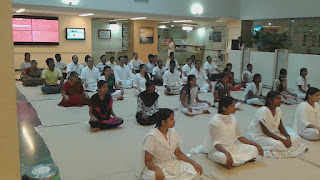21st March is observed as World Down Syndrome Day. The date represents the three copies of chromosome 21, which is unique to people with Down syndrome. Such people have 47 chromosomes instead of the usual 46 (23 pairs). The extra chromosome appears with the 21st pair.
On the eve of this day, Dr.Deepthi Jammi, from the Department of Fetal Medicine in Apollo Cradle, elaborates on the importance of ultrasound scanning during pregnancy. “An early pregnancy scan done at 11 – 14 weeks of pregnancy along with a blood test referred as first trimester biochemical screening is being offered to all pregnant mothers these days to understand the possibility of them carrying a chromosomally affected child”, she says.
What is Down syndrome?
Down syndrome is the most common chromosomal disorder which leads to intellectual disability and other various health problems in a child. Children with Down syndrome typically display mild to moderate intellectual disability and other health problems. They generally have a flat facial profile with low set ears and upward slanting eyes. Long term health issues are a concern in these children who require adequate prophylactic treatment.
During their formative stages, a child develops the expected physical, cognitive, communication and social skills expected of him/her. However, there may be certain other areas where they may progress slower than normal and it is for this reason that early detection is strongly recommended. Therapies such as occupational, speech and language therapy have been devised to boost the quality of life that a child with Down syndrome can enjoy.
Who is at risk?
Worldwide, one in every 700 live births is a Down syndrome baby. Until the first trimester screening test became available less than a decade ago, a woman over the age of 35 would have routinely been offered an invasive testing such as Chorionic villous sampling in her first trimester (uptil 3 months of pregnancy) or an Amniocentesis (4th month of pregnancy) in her second trimester. This is because older mothers are at an increased risk of bearing a child with Down Syndrome. The frequency rises from one in 1,400 babies for a woman between 20 and 24 years old, to one in 25 for a woman over 45 years of age.
What constitutes a first trimester screening?
The first trimester screening examines features unique to fetuses with Down syndrome between 11 and 14 weeks of pregnancy.
In an ultrasound scan which emits high frequency sound waves through the uterus to monitor the pregnancy, Fetal Medicine specialists check the Nuchal translucency (NT - thickness of skin at the back of the neck) and Nasal bone of the fetus to assess the risk of the baby having Down syndrome. The absence of the nasal bone and a thicker-than-normal neck skin indicates an increased risk of the fetus having the abnormality.
Following this the mother's blood is also tested for a combination of markers such as pregnancy-associated plasma protein A(Papp-a), which tends to be low in Down syndrome pregnancies and beta human chorionic gonadotropin (B Hcg), which is raised in such pregnancies .Other factors, such as the mother's age, are used to assess the risk using the Fetal Medicine Foundation risk calculation software.
If the result is one in 250 or higher, it is typically recommended to undergo an invasive diagnostic procedure such as Chorionic villous sampling (CVS) or Amniocentesis which carries a small percentage risk of miscarriage. Dr.Deepthi explains that in these procedures, a needle is inserted in the woman's uterus to draw out either amniotic fluid (amniocentesis) or tissue from the placenta (CVS). The fluids contain cells from the baby which are examined for the chromosomal abnormality.
Recent technologies such as Non-invasive prenatal testing , a blood test which tests the fetal cells in the mother’s blood, have revolutionized the field of prenatal medicine offering tremendous potential as a screening tool with high sensitivity and specificity of the test for diagnosing such fetuses.
What causes Down syndrome?
While the exact cause is currently unknown, research indicates that as a woman ages, the probability of her bearing a child with Down syndrome increases. However, there is no research finding that suggests that the mother’s lifestyle before or during the pregnancy influences this probability.There are multiple types of Down syndrome. Irrespective of the type, all those born with Down syndrome have the extra partial or full pair of Chromosome 21, which may be obtained either from the father or the mother.
How can we support them?
Dr.Deepthi strongly stresses that those with Down syndrome, with the help of timely intervention, can be benefited to a significant extent. While they may learn and develop at their own pace, they can have a clear idea of the choices that they make to be as productive, independent and confident they can.
From a parenting perspective, she recommends that parents adopt a system of constantly encouraging a positive attitude and independence. With a balance of guidance and independence, those with Down syndrome can make rapid strides to be strong members of society.
To celebrate and spread awareness: Join DR.DEEPTHI JAMMI : MBBS., M.S.(OG)., Obstetric Sonology(Mediscan).,Postdoctoral fellowship in Fetal Medicine (TN.Dr.MGR University) at DEPARTMENT OF FETAL MEDICINE, APOLLO CRADLE,KARAPAKKAM,OMR on March 21st 9am – 4pm










